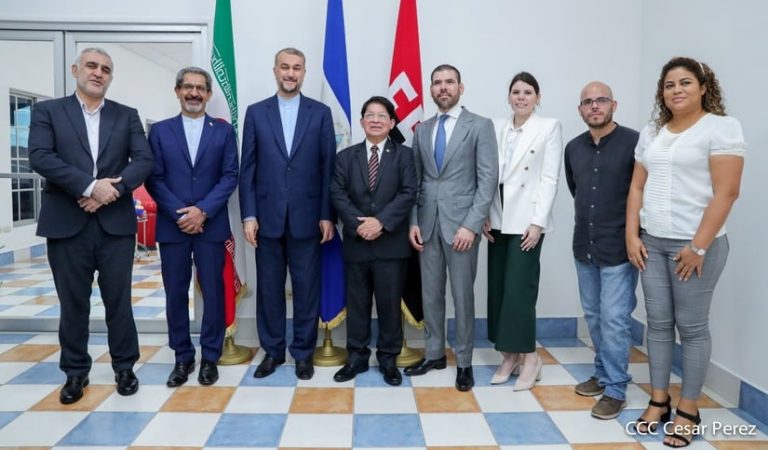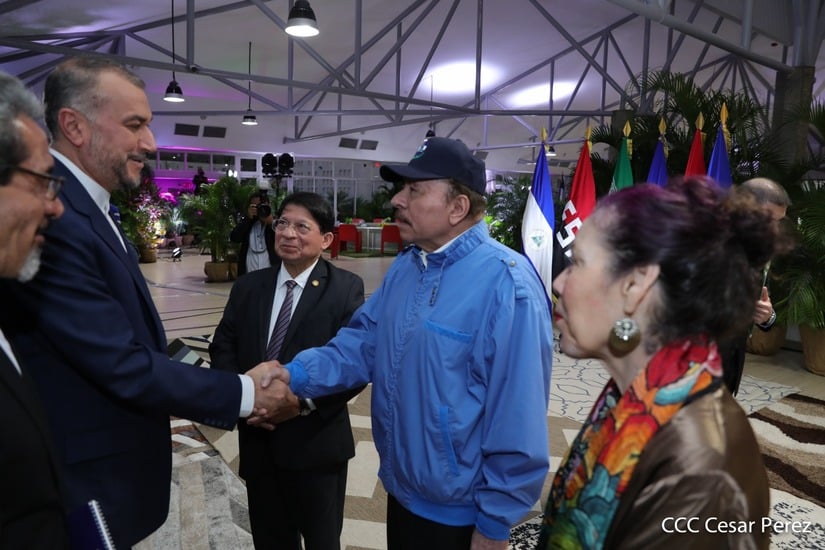6 de febrero 2023

The Return of the Military

PUBLICIDAD 1M
PUBLICIDAD 4D
PUBLICIDAD 5D
Former US Ambassador John Feeley considers the offer a “bad joke.” Visit of Iranian Foreign Minister was characterized by rhetoric and zero results.

The dictatorship of Daniel Ortega and Rosario Murillo suggested to turn Nicaragua into an Iranian “platform” in Central America, during a visit this week by that country’s foreign minister, Hossein Amir-Abdollahian, in which promises and an intense anti-US rhetoric predominated. The bearer of the message was Laureano Ortega, son of the ruling couple.
Ortega Murillo, advisor for investments, commerce, and international cooperation of the Nicaraguan regime, expressed that he felt pleased with the presence of the Iranian diplomat, which he considers an “honor for Nicaragua.”
The dictatorship’s propaganda media disclosed friendly photos of a governmental delegation with “Dr. Hossein,” while the official version delved into Ortega Murillo’s proposal to Iran.
“We are fighting peoples, heroic peoples and brotherly peoples. Iran has a great technological, industrial, commercial development, of which Nicaragua could highly benefit and Nicaragua has and plays a fundamental role in the Central American region as a platform to export products, to become a showcase for Iranian products in the entire Central American region. It also plays an important role in diplomacy and geopolitics,” said Laureano Ortega Murillo.
However, former US Ambassador to Panama, John Feeley, an expert on the region with 29 years of experience in his country’s diplomatic service, asserted that the proposal made by the son of the ruling couple is a “bad joke.”
“According to the online magazine, Trading Economics, 82% of Iran’s exports are oil and its byproducts. The Iranians do not manufacture anything that Nicaraguans and Central Americans need, apart from oil, and that is under international sanctions,” said the diplomat, who notes that both Iran and Nicaragua are international pariahs.
Feeley added that it is not surprising that big projects are announced by them. What would be surprising “is if they do one-tenth of what they talk about.” He emphasized that he wonders how logistics would be for there to be commercial activity between the two countries, precisely because of the issue of sanctions.
Former deputy Eliseo Nunez said what is troubling is that Ortega is forging an alliance against the United States, after the Russian invasion of Ukraine. “Nicaragua will hardly gain anything from Iran that is a net importer of food. It is not a country that has the possibility of buying from Nicaragua, because of logistical issues, costs and if any purchases are made, they will be marginal,” he stated.
Laureano Ortega Murillo is also the liaison for diplomatic and economic relations with Russia, which is causing concern in the Central American region. In December 2022, regarding the strengthening of relations with Vladimir Putin, the former president of Costa Rican, Luis Guillermo Solis said that you could perceive the possibility of the installation of a Russian base in the heart of the region.
Feeley said, on the specific case of Iran, that Ortega wants to impress, “as if it were a serious country, when he is a tyrannical dwarf who is only capable of torturing his people as an abusive father. Regarding Iran, as the saying goes, “birds of a feather…”
The meeting of the Nicaraguan regime with the Iranian foreign minister was held on Wednesday, February 1, 2023. Two more children of the presidential family participated, Camila and Daniel Ortega Murillo, the first in her capacity as general director of the National Commission on Creative Economy and the other representing the pro-government media. In the pictures also appears Nicaraguan Foreign Minister, Denis Moncada Colindres.
The diplomat’s tour lasted two days and was part of his journey to Africa and Latin America. He met with the leadership of the regime’s National Assembly, visited the facilities of the Miramar Fuel Storage Center —another of the big unfulfilled promises of the Nicaraguan dictatorship— and finally on Thursday, February 2, he was received by Ortega and Murillo to reconfirm the strengthening of ties.

Dictators Daniel Ortega and Rosario Murillo also received Iranian Foreign Minister, Hossein Amir-Abdollahian. Photo: Taken from 19 Digital.
Based on the transcript of the official speech, Ortega mentioned the United States 27 times, when he recalled the “Yankee” participation in Nicaraguan history and rejected its meddling in internal affairs. But the dictator has also received the backing of other countries such as Russia, China, and Iran itself, but in those cases he calls it “solidarity.”
Ortega has opted for a diplomacy of self-isolation since 2018, when the regime brutally repressed hundreds of demonstrators who were peacefully protesting. He said, without any evidence, that he was the target of a “coup d’état,” but what the international community found was that serious abuses had been committed against citizens, which remain in impunity.
Eliseo Nunez noted that Ortega’s advantage by getting closer to Iran is that that country has been sanctioned since the 1980’s by the international community, and “that means they know how to evade sanctions. That is his real interest. In the long-term, (Nicaragua) is not going to gain anything,” he reiterated.
After the eighties, it was in January 2007 when Ortega welcomed Iran’s president, Mahmoud Ahmadinejad, to participate in his inauguration. Six months later, the ruler signed cooperation agreements with the Energy Minister, Hamid Chitchian. However, as it has happened with Iran in general, in the end the promises remain unfulfilled.
A report published by Confidencial in May of 2022 revealed that this “ideological partnership” for 16 years had not translated into “concrete economic development projects.”
The pattern has been maintained if one reviews the data from the Nicaraguan Budget between 2018 and 2023. And the same occurs with other allies of the dictatorship such as Cuba, Venezuela, Russia, and China.
In January 2022, in his third consecutive inauguration, Ortega greeted Mohsen Rezai, a high-level Iranian official. He is accused of masterminding the worst bombing in Argentina’s history that left 84 dead in 1994. This visit caused a worldwide scandal and entailed internal criticism of the Argentinian government. Against criticism for human rights violations, the script for both Iran and Nicaragua appears to be the same: to support each other.
Moncada traveled to Tehran in December 2022, when Iran was questioned for its human rights violations. Human Rights Watch denounced last month that 341 demonstrators died, including 52 children, in the context of the protests, according to a note from the EFE news agency.
The human rights organization also explained that 16 death sentences had been issued in Iran and four people had been executed in this repressive environment.
Mass protests erupted last September when a young woman, Mahsa Amini, who was detained by the “Morality Police” for not wearing properly the mandatory veil for women, died in police custody.
However, on his trip, Moncada ignored serious local abuses. “We will resist domination, and we will win,” Ortega’s foreign minister said, ignoring the international outcry.
This week visit by the Iranian Foreign Minister to Nicaragua comes as France questions the Ayatollah’s regime for what it calls a “precipitous advance of Iran’s (nuclear) program.” President Emmanuel Macron warned that there will be “inevitable consequences.”
The issue was covered by Deutsche Welle (DW). It also reported that Iran began enriching uranium, “well above the 3.67% threshold set by the 2015 agreement on its nuclear program and is approaching the 90% needed to produce a nuclear bomb.”
This article was originally published in Spanish in Confidencial and translated by Havana Times
PUBLICIDAD 3M
Periodista nicaragüense, exiliado. Comenzó su carrera en el año 2000, cuando todavía era estudiante. Por sus destacadas investigaciones periodísticas ha ganado el Premio Ortega y Gasset, el Premio Internacional de Periodismo Rey de España, el Premio a la Excelencia de la Sociedad Interamericana de Prensa, y el Premio Latinoamericano de Periodismo de Investigación del Instituto Prensa y Sociedad (IPYS).
PUBLICIDAD 3D